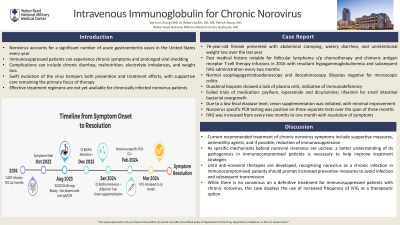Sunday Poster Session
Category: Small Intestine
P1540 - Intravenous Immunoglobulin (IVIG) for Chronic Norovirus
Sunday, October 27, 2024
3:30 PM - 7:00 PM ET
Location: Exhibit Hall E

Has Audio
- RS
Robert Spiller, DO, MS
Walter Reed National Military Medical Center
Bethesda, MD
Presenting Author(s)
Yae-Eun Chung, BS1, Robert Spiller, DO, MS2, Patrick Young, MD2
1PCOM, Suwanee, GA; 2Walter Reed National Military Medical Center, Bethesda, MD
Introduction: Norovirus accounts for a significant number of acute gastroenteritis cases. However, immunosuppressed patients can experience chronic symptoms. The swift evolution of the virus hampers both prevention and treatments; consequently, supportive care remains the primary focus of therapy. An effective treatment regimen is not yet available for chronically infected norovirus patients. However, intravenous immunoglobulin (IVIG) administration can be effective in immunosuppressed patients. We review a case of chronic norovirus in an immunosuppressed patient and the resultant administration of IVIG as treatment.
Case Description/Methods: A 76-year-old female with stage 3 chronic kidney disease and follicular lymphoma presented with watery diarrhea for 13 months. She had undergone chemotherapy and chimeric antigen receptor T-cell therapy infusions in 2016 with resultant hypogammaglobulinemia. She was on IVIG every two months but developed chronic diarrhea, including nocturnal episodes. She had an endoscopically normal esophagogastroduodenoscopy and colonoscopy with biopsies negative for microscopic colitis. The duodenal biopsies showed a lack of plasma cells, indicative of immunodeficiency. Serologic testing for celiac disease was negative. Psyllium, loperamide and dicyclomine were unhelpful. Small intestinal bacterial overgrowth was considered, and she was trialed on rifaximin, only to provide one week of symptom relief. Due to a low fecal elastase level, creon supplementation was initiated, with minimal improvement. Infectious stool tests were negative other than norovirus specific PCR testing, which was positive on three separate tests over the span of three months. The patient’s IVIG was then increased from every two months to one month. Consequently, her symptoms resolved.
Discussion: This case illustrates that increased frequency of IVIG administration in a chronically infected norovirus patient can result in symptom resolution. Specific mechanisms behind noroviral clearance are unclear. Thus, a better understanding of its pathogenesis in immunocompromised patients is necessary. Until anti-noroviral therapies are developed, recognizing norovirus as a chronic infection in immunocompromised patients should prompt increased preventive measures to avoid infection and subsequent transmission. While there is no consensus on a definitive treatment for immunosuppressed patients with chronic norovirus, this case displays the use of increased frequency of IVIG as a therapeutic option.
Disclosures:
Yae-Eun Chung, BS1, Robert Spiller, DO, MS2, Patrick Young, MD2. P1540 - Intravenous Immunoglobulin (IVIG) for Chronic Norovirus, ACG 2024 Annual Scientific Meeting Abstracts. Philadelphia, PA: American College of Gastroenterology.
1PCOM, Suwanee, GA; 2Walter Reed National Military Medical Center, Bethesda, MD
Introduction: Norovirus accounts for a significant number of acute gastroenteritis cases. However, immunosuppressed patients can experience chronic symptoms. The swift evolution of the virus hampers both prevention and treatments; consequently, supportive care remains the primary focus of therapy. An effective treatment regimen is not yet available for chronically infected norovirus patients. However, intravenous immunoglobulin (IVIG) administration can be effective in immunosuppressed patients. We review a case of chronic norovirus in an immunosuppressed patient and the resultant administration of IVIG as treatment.
Case Description/Methods: A 76-year-old female with stage 3 chronic kidney disease and follicular lymphoma presented with watery diarrhea for 13 months. She had undergone chemotherapy and chimeric antigen receptor T-cell therapy infusions in 2016 with resultant hypogammaglobulinemia. She was on IVIG every two months but developed chronic diarrhea, including nocturnal episodes. She had an endoscopically normal esophagogastroduodenoscopy and colonoscopy with biopsies negative for microscopic colitis. The duodenal biopsies showed a lack of plasma cells, indicative of immunodeficiency. Serologic testing for celiac disease was negative. Psyllium, loperamide and dicyclomine were unhelpful. Small intestinal bacterial overgrowth was considered, and she was trialed on rifaximin, only to provide one week of symptom relief. Due to a low fecal elastase level, creon supplementation was initiated, with minimal improvement. Infectious stool tests were negative other than norovirus specific PCR testing, which was positive on three separate tests over the span of three months. The patient’s IVIG was then increased from every two months to one month. Consequently, her symptoms resolved.
Discussion: This case illustrates that increased frequency of IVIG administration in a chronically infected norovirus patient can result in symptom resolution. Specific mechanisms behind noroviral clearance are unclear. Thus, a better understanding of its pathogenesis in immunocompromised patients is necessary. Until anti-noroviral therapies are developed, recognizing norovirus as a chronic infection in immunocompromised patients should prompt increased preventive measures to avoid infection and subsequent transmission. While there is no consensus on a definitive treatment for immunosuppressed patients with chronic norovirus, this case displays the use of increased frequency of IVIG as a therapeutic option.
Disclosures:
Yae-Eun Chung indicated no relevant financial relationships.
Robert Spiller indicated no relevant financial relationships.
Patrick Young: Elements Endoscopy – Consultant.
Yae-Eun Chung, BS1, Robert Spiller, DO, MS2, Patrick Young, MD2. P1540 - Intravenous Immunoglobulin (IVIG) for Chronic Norovirus, ACG 2024 Annual Scientific Meeting Abstracts. Philadelphia, PA: American College of Gastroenterology.
